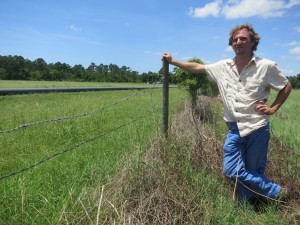Eminent Domain: In Texas, Landowners Face Continued Uncertainty

Photo by Mose Buchele
Jake White, a Jefferson Country farmer, looks at a section of the Crosstex NGL pipeline before it is buried under his field.
This is part one of a three-part series devoted to looking at efforts to overhaul eminent domain in Texas and what may come next for landowners, pipeline companies, and the oil and gas industry. Read Part Two here.
At Margaret O’Keefe’s farm, outside of Beaumont in East Texas, they grow high quality Bermuda grass. The fields are flat, vibrant light green and dotted with crawfish burrows. They’re surrounded by woods of a darker, richer green.
The land has deep significance to the family. O’Keefe inherited it from her mother who divided it among her eight children.
“She used to call it ‘Enchanted Valley,'” O’Keefe reminisced on a muggy summer afternoon while driving through her fields. “Sometimes it rains here and it won’t rain anywhere else. And sometimes it rains outside of here and rain never touches here.”
Her ‘Enchanted Valley’ also lies in the path of the Crosstex NGL Pipeline. That’s a 130-mile, multimillion-dollar project to funnel natural gas liquids from Texas to processing plants in Louisiana.
All across the state, a rush is on to build up infrastructure to transport the vast reserves of oil and gas unleashed by hydraulic fracturing, or “fracking.” Pipelines are the preferred method. But, as is the case at the O’Keefe’s farm, the plans of the pipeline companies often clash with the desires of landowners.
Over a lunch of tamales at her kitchen table, O’Keefe and her brother Dick told the story of how the pipeline came to the farm. They say it started when a man representing Crosstex knocked on the door. Companies often approach farmers in Texas about using their land. So, as she had learned years ago, O’Keefe told him she didn’t want anyone on her property until the company agreed to cover liability in case a worker got hurt.
“And they just kind of ignored it and surveyed the property regardless,” she said.
Upset, O’Keefe and her brother told Crosstex they didn’t like the offer the company had made.
“They turned it over to the lawyers. We got a nice fat packet in the mail that said, ‘We’ll see you in court,” Dick O’Keefe said.
Crosstex had checked a box on a state government form called a T-4, declaring itself a “common carrier.” That’s how companies get the right of eminent domain for pipelines. It means that if the O’Keefes weren’t going to sell the land, the company would take it anyway, paying a price determined at the courts. The O’Keefes could have challenged Crosstex in court, but that was an option they quickly rejected.
“We, as small land owners, we can’t afford to fight this pipeline company,” explained Dick.
So, they settled with the company. And their story might have ended there, except a nearby landowner, a wealthy trial lawyer, decided he would challenge the company.
At the County Court, a judge ruled that Crosstex did not have the right to take peoples’ land. The 9th District Appeals Court reaffirmed that ruling. More appeals may lie ahead, but, for the time being, that means the pipeline that now runs under the O’Keefe farm did not have the right to be there in the first place. The very assumption that led the O’Keefes to settle with the company Crosstex has been thrown into question by the courts.
“The pipeline companies should have to demonstrate that they have the right of eminent domain before they ever start beating the streets and handing out contracts,” said Dick O’Keefe, thinking back on the experience. “Which they don’t have to do. The threshold for them is extremely low.”
He’s not the only one who thinks so. His opinion is almost exactly what the Texas Supreme Court ruled two years ago. And what state lawmakers have been saying ever since. Companies need to do more to prove they can take people’s land. Checking a box on a form is not enough.

Photo by Raymond Thompson
Rep. Rene Oliveira, second from left, attending a forum on eminent domain at the Texas Tribune Festival 2012. Oliveira filed a bill to overhaul eminent domain in Texas this year.
Even pipeline companies suggest that some kind of overhaul is necessary. Before this year’s regular legislative session, key players — from landowner groups, to oil and gas interests, to environmentalists — were scrambling to influence legislation to change the system of eminent domain in Texas.
“I had believed that this was certainly going to be one of the top ten issues of the session,” said State Representative Rene Oliveira (D-Brownsville), one of a handful of lawmakers who filed bills on the subject.
But efforts to overhaul eminent domain failed.
“This was the definition of ‘Politics makes strange bedfellows,'” Norman Garza, with the Texas Farm Bureau, said after the session was over. “Because there were just so many people that were involved in this in terms of their interests.”
COMING TUESDAY: In the next installment of our three-part series, StateImpact Texas will explore what happened to efforts at state legislature to overhaul eminent domain, and what the failure of those efforts means for landowners, pipeline companies, and oil and gas in Texas. Read that story here.


